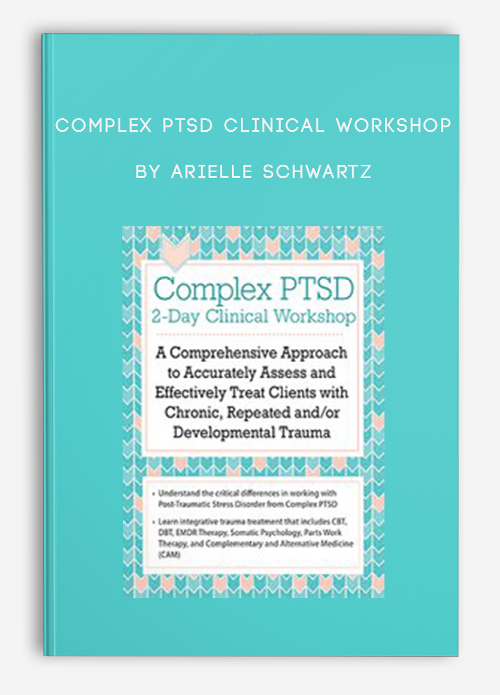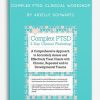Complex PTSD Clinical Workshop by Arielle Schwartz
$62.00
- Description
Description
Complex PTSD Clinical Workshop A Comprehensive Approach to Accurately Assess and Effectively Treat Clients with Chronic, Repeated andor Developmental Trauma by Arielle Schwartz
Faculty:Arielle Schwartz
Duration:12 Hours 20 Minutes | Format:Audio and Video
Archive : Complex PTSD Clinical Workshop by Arielle Schwartz
Get Complex PTSD Clinical Workshop by Arielle Schwartz on bestoftrader.com
Outline:
Post-Traumatic Stress Disorder vs. Complex PTSD: Understand the Difference
- Acute traumatic stress, PTSD, Complex PTSD
- Diagnostic clarification and differential diagnosis
- Key contributing factors of Complex PTSD
- The common symptoms of Complex PTSD
The Neurobiology of PTSD: Beyond Fight and Flight
- Polyvagal Theory
- 6 Stages of trauma response
- Heart Rate Variability and the Social Nervous System
- Interpersonal Neurobiology
- Psychobiological regulation
- Rupture and repair
- Implications of childhood neglect or abuse
- Neuroplasticity and Complex PTSD
Psychological and Physiological Repercussions of Complex PTSD: A Deeper Understanding for Accurate Assessment
- Intrusive symptoms and anxiety
- Emotional dysregulation: Outbursts of anger and debilitating shame
- Avoidance symptoms and phobic reactions to traumatic material
- Interpersonal problems and difficulty being close to others
- Dissociation and dysregulation
- Cognitive distortions and compromised meaning making
- Physical health problems, ACE factors and painful somatization
- Preverbal and nonverbal memories
- Disturbing somatic sensations
- Depressive symptoms
- Learned helplessness and shame
Therapeutic Interventions for Complex PTSD: Summary of Effective Therapies
- Psychodynamic and Relational Therapy
- Psychobiological perspectives: Polyvagal Theory
- Cognitive Behavioral Therapy (CBT)
- Dialectical Behavioral Therapy (DBT)
- EMDR Therapy
- Somatic Psychology
- Parts Work Therapy: Work with Ego States
- Complementary and Alternative Medicine (CAM): mindfulness, yoga, and integrative healthcare
Integrative Treatment for Complex PTSD: Putting it All Together for an Effective Treatment Plan
- A biopsychosocial approach: Partner with clients to build a health care team
- Goal of treatment: Memory retrieval vs. trauma recovery
- History taking: Identify chronic, repeated, and/or developmental trauma events
- Cultural factors and Complex PTSD
- Recognize attachment Injuries
- How to work with transgenerational trauma
- Identify parts, ego states and defenses
- Assess for dissociation
- Mutual regulation and relational repair in therapy
- Prepare for trauma processing: Develop resources and stability
- Work through traumatic memories: EMDR and Somatic Psychology
- Grief work in Complex PTSD
- Integrate and Instill positive change
Experiential Interventions: Mind-Body Practices for Clients with Complex PTSD
- Conscious breathing for self-regulation
- Grounding and sensory awareness
- Containment: Reclaim choice and control
- Build imaginal allies
- Cultivate mindfulness, acceptance, and self-compassion
- Somatic interventions: Titration, sequencing, and somatic re-patterning
- Bilateral stimulation and dual attention in EMDR Therapy
- Potential risks and limitations of mind-body therapies
Fostering Resilience: For Post-Traumatic Growth and Healing
- Learn the 6 Pillars of Resilience
- Trauma recovery and the bell curve
- Resilience as a process and an outcome
- Help clients move from learned helplessness to learned optimism
- Post-Traumatic Growth: Help clients reach their potential
Vicarious Trauma: Improve Client Outcomes Through Effective Self-Care
- Identify resources that improve your clinical skills
- In-session self-care to improve focus on the client and therapeutic process
- Burnout prevention techniques
Please Note: PESI is not affiliated or associated with Marsha M. Linehan, PhD, ABPP, or her organizations.
Get Complex PTSD Clinical Workshop by Arielle Schwartz on bestoftrader.com
Description:
Many clinicians are trained in the treatment of single traumatic events, but are not fully equipment to treat Complex PTSD. The traditional approaches to the treatment of PTSD can fall short when working with clients with Complex PTSD. Watch this recording to learn how you can adapt your therapeutic approach to help clients diagnosed with Complex PTSD achieve more successful outcomes.
The most common question asked when treating Complex PTSD is, “where do I start?”. In this training, you will develop confidence in your ability to successfully organize and prioritize your client’s treatment goals. You will learn how to compassionately and effectively work with clients who have experienced multiple traumatic events and prolonged trauma exposure.
Successful treatment requires a compassionate therapeutic relationship and effective, research-based interventions. After this two-day workshop you will learn how to:
- Help clients move out of crisis by building stabilizing resources
- Prepare clients to work through traumatic memories without becoming Overwhelmed
- Develop an integrative trauma treatment plan that includes CBT, DBT, EMDR Therapy, Somatic Psychology, Parts Work Therapy, and Complementary and Alternative Medicine (CAM).
In this recording, Dr. Arielle Schwartz will show you an engaging and interactive way to learn valuable strategies that will allow you to successfully address the dysregulated affect and arousal states that accompany Complex PTSD. You will leave this seminar with practical tools that facilitate a strength-based approach to trauma recovery and increased resilience in clients.















